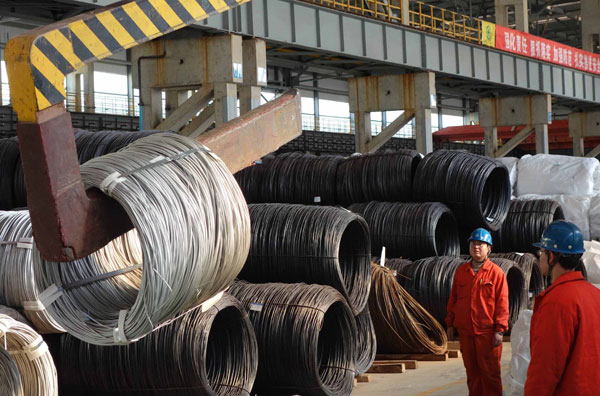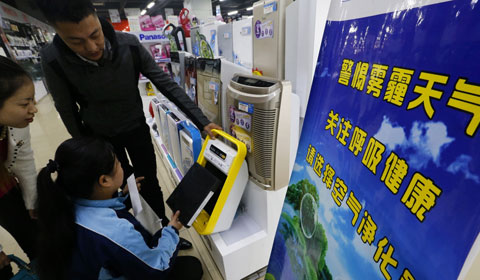PMI heads for 7-month high
Updated: 2013-10-25 00:38
By Chen Jia (China Daily)
|
||||||||
Rising domestic demand provides firm basis for expansion in the industrial sector
 |
|
Stainless wires are moved into the warehouse at a specialty steel plant in Dalian, Liaoning province. China is moving to cut excess industrial capacity, especially in the iron and steel, electrolytic aluminum, cement and shipbuilding sectors. Liu Debin / For China Daily |
British bank HSBC Holdings Plc said that China's manufacturing Purchasing Managers' Index will rise to a seven-month high of 50.9 in October, up from 50.2 in September, suggesting the overall economic growth momentum is likely to be extended after the recovery seen in the third quarter.
Stronger domestic demand supported a rise in the output sub-index to 51 — a six-month high — compared with a reading of 50.2 for the sub-index in September, HSBC's flash PMI data showed.
New orders and export orders also are stronger.
A reading above 50 means expansion in the manufacturing sector.
Based on the strong recovery in the third quarter, when the GDP growth rate rebounded to 7.8 percent from 7.5 percent in the second quarter, business confidence has been boosted, and that can lead to an increase of inventories in factories, economists said.
Qu Hongbin, chief China economist at HSBC, said the better-than-expected PMI preliminary reading indicates that China's growth recovery is consolidating in the fourth quarter.
"This momentum is likely to continue in the coming months, creating favorable conditions for speeding up structural reforms," Qu said.
Analysts anticipate that the Third Plenary Session of the Central Committee of the Communist Party of China, which will be held in November, will focus on more comprehensive reforms within the current favorable economic conditions.
The upcoming meeting will be a milestone for the country's development, as economic policies for the next decade are expected to lay out a more open and dynamic system, analysts said.
"In the next three to six months, financial reform may make further progress to illustrate the determination for structural reform by the new leaders, and likely policy actions include approval of privately owned banks and the introduction of a deposit insurance system," said Zhu Haibin, chief China economist at JPMorgan Chase & Co.
Zhu also said that measures to address major structural problems, such as overcapacity, investment inefficiency and financial imbalances, need to be strengthened and implemented after the meeting.
Meanwhile, Standard Chartered Plc raised its forecast for China's 2013 GDP growth to 7.6 percent on Wednesday, up from the previous 7.5 percent forecast.
The bank also revised its consumer inflation forecast to a 2.7 percent year-on-year rise for 2013 from 2.5 percent previously.
A report from Standard Chartered called the economic rebound that has taken hold since the third quarter "a broad-based recovery".
"In 2014, improvements in the global industrial cycle should to some extent offset the current structural slowdown in China," the report said.
The report also said it expects policymakers to keep benchmark interest rates unchanged this year and in 2014.
"We think the People's Bank of China will likely use the opportunity to push interest rate reform. The central bank is likely to lift the ceiling on the term-deposit savings rate from 10 percent to 20 percent or 30 percent above the benchmark rate in the first half next year. Given the strong competition for deposits, this would lead to many banks, particularly smaller institutions, raising deposit rates to the new level," the report added.

 Giant duck to exit after drawing the crowds
Giant duck to exit after drawing the crowds
 Miss Universe 2013 to be held in Moscow
Miss Universe 2013 to be held in Moscow
 Ministry to begin inspecting most heavily polluted regions
Ministry to begin inspecting most heavily polluted regions
 Spy claims stir rebuke to Obama
Spy claims stir rebuke to Obama
 Paint the world a picture
Paint the world a picture
 World's first 1-liter car debuts in Beijing
World's first 1-liter car debuts in Beijing
 Latin American clown convention
Latin American clown convention
 Prince George baptized in London
Prince George baptized in London
Most Viewed
Editor's Picks

|

|

|

|

|

|
Today's Top News
US will stage foreign investment summit
Chinatown restaurants learn how to get an 'A'
Snuff bottle 'gems' on display at Met
Beijing airport set to become world's busiest
US firms urge easier process for investment
China calls for strengthened EU ties
Spy claims stir rebuke to Obama
Court upholds verdict of Bo Xilai
US Weekly

|

|







